James McGuire has Left the Building, But Will Dallas’ City Hall Continue to Neglect Environmental Health and Justice Remain?
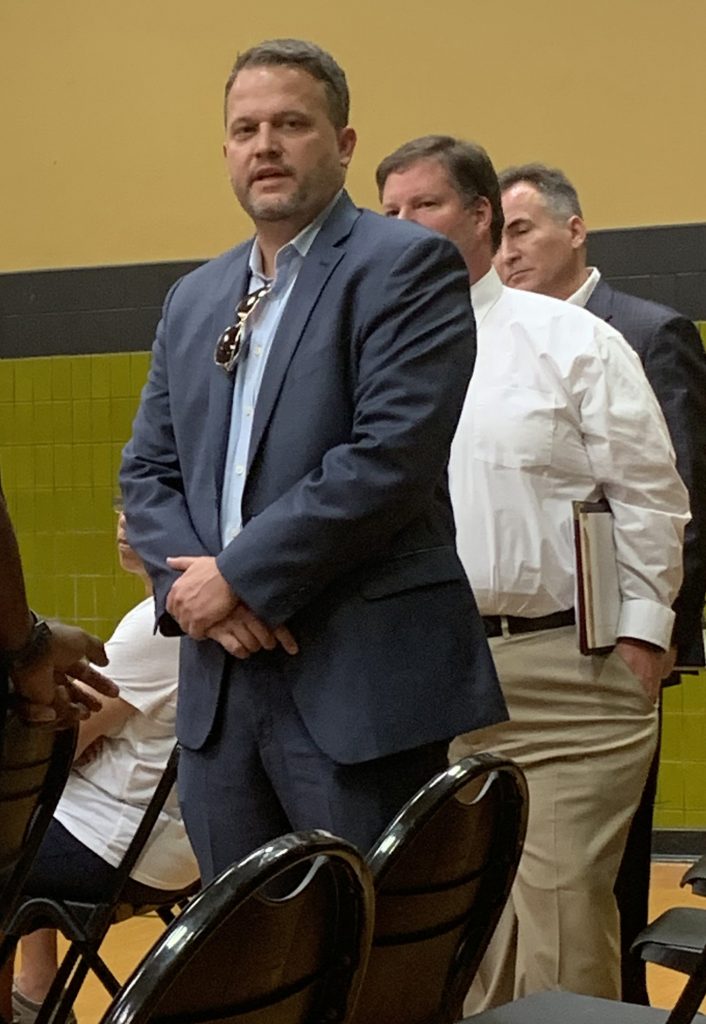
Friday was reportedly James McGuire’s last day as Dallas’ Director of the Office of Environmental Quality and Sustainability. He’s said to be taking leave for the rest of July and then he’ll move on…to a position at the Trump EPA. After serving for sometime as an “Interim Director,” he’d been the real thing for the last three years.
McGuire’s departure comes almost a month before the unveiling of the implementation schedule of his crowning achievement, Dallas’ Climate Plan, in front of the City Council. Speculation about his leaving ranges from this being a done deal triggered by the Climate Plan’s passage in May, to being fallout from the City being included as a defendant in Marsha Jackson’s Shingle Mountain lawsuit two weeks ago.
During his tenure McGuire, a City attorney who got assigned the OEQS position, earned kudos for policies that directly affected internal City operations – where and how the City bought electricity for it’s facilities, or how efficiently city operations saved water.
But almost every time he stepped outside of City Hall into public policy his record has been a disaster, especially for Southern Dallas.
Time and again, when McGuire had the chance to help Southern Dallas residents, he turned his back, or worse, contributed to the problem they were complaining about. A short list of his “greatest misses” includes:

- Promotion of Batch Plants in Southern Dallas. In 2018 and 2019 four separate batch plants were trying to win permission from the city to locate in already overburdened Joppa and Flora Farms (Shingle Mountain). McGuireand OEQS endorsed all of them. But much worse was McGuire’s purposely misleading statements about current air quality in Joppa during the Council’s debate on the permits. Asked if current Particulate Matter pollutant levels in Joppa should be of any concern, McGuire disingenuously said EPA monitors “in Dallas” showed levels “meeting national standards.” It wasn’t until a pointed follow–up question from a Council Member reveled the cynicism of his answer: the nearest (and only) EPA PM monitor was nine miles away, on the other side of downtown. Residents defeated all four batch plant permits despite OEQS’s endorsement.
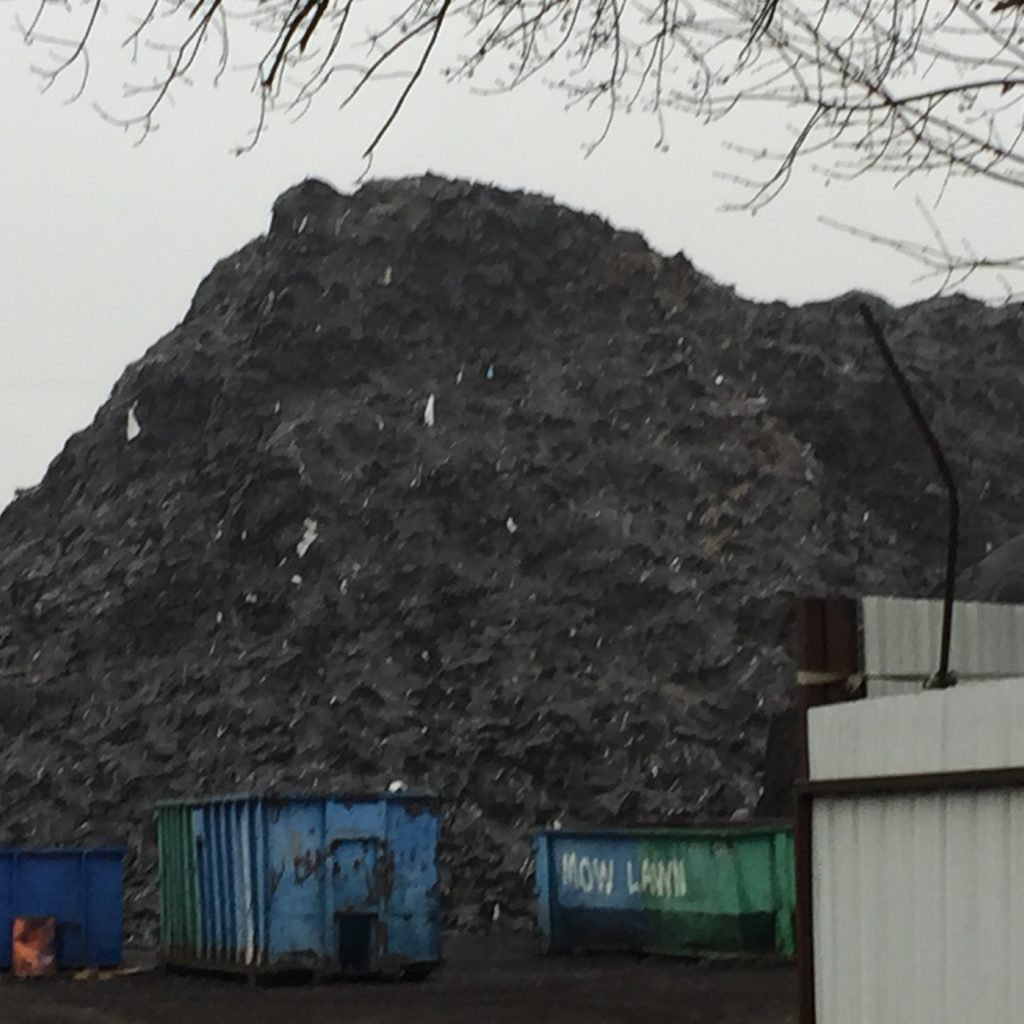
- Creation of Shingle Mountain. The six story 100,000 ton illegal dump – Dallas’ largest and most dangerous – was over a year and a half old and was violating a multitude of laws and regulations with impunity when McQuire first learned about it from DMN columnist Robert Wilonsky. The most notorious environmental justice disaster in Dallas in 25 years happened on his watch without him or anyone in his department noticing. Compounding this mistake – which nobody has every apologized for – was the OEQS’ absolute obsession with storm water non-compliance issues at the dump to the exclusion of any concern for adjacent residents’ health from fumes or particulate matter containing carcinogens. At no point over the last two years has McQuire or OEQS said anything about how toxic the dump is to human health, but he and the Department have been very, very concerned about illegal storm water runoff.
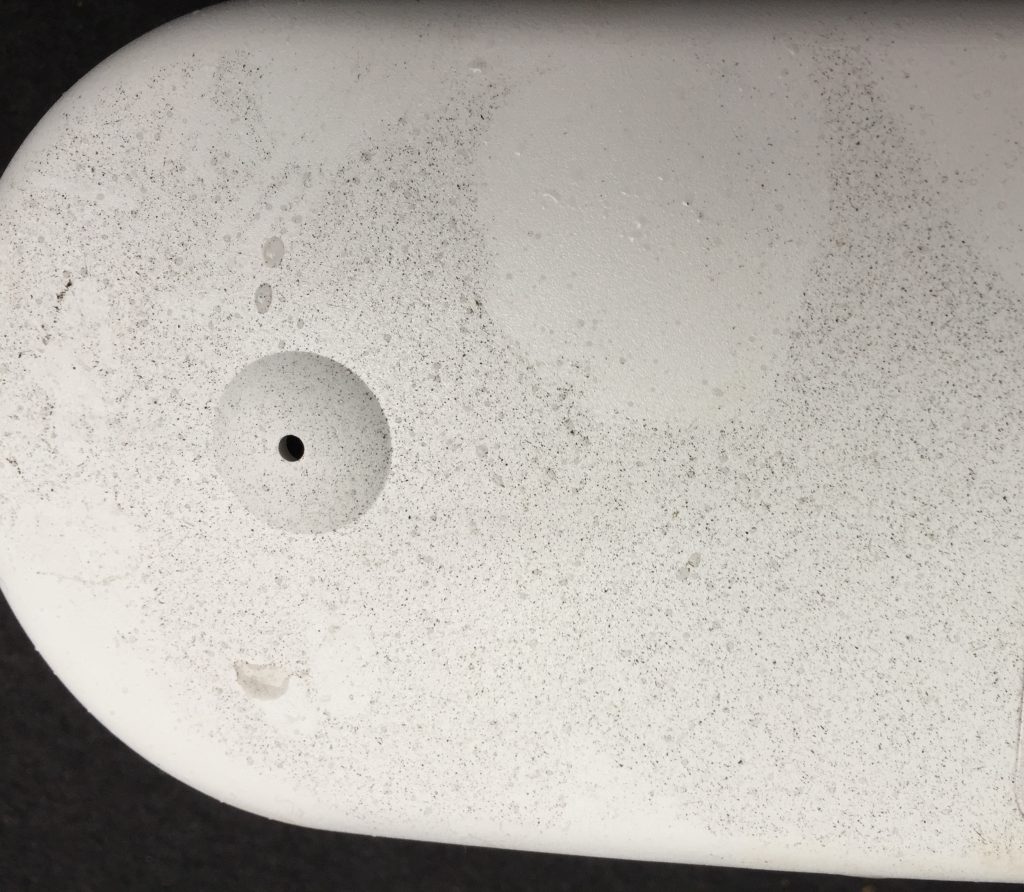
- Denying pleas for air quality monitoring from residents of Joppa and Shingle Mountain. In 2018 OEQS representatives rejected Joppa residents’ request that the City provide air quality monitoring – even after portable monitor readings by Downwinders found high levels of PM pollution there, and even though the City had the monitoring equipment to do so. McGuire and OEQS also tuned down Marsha Jackson’s pleas to do air monitoring at her house under the six-story Shingle Mountain illegal dump, even though Downwinders’ portable monitors placed on her windowsill were completely covered in a black dust and recorded hazardous levels of PM pollution.

- The collapse of the City’s “Breathe Easy” air monitoring initiative. After planning for years to deploy 10 to 12 air monitors at public schools in Dallas, the City finally identified the schools it wanted to participate, bought a dozen new Aeroqual air quality monitors, and then informed DISD of its intent. DISD said no thanks; they didn’t want the monitors on school property. The 12 brand new monitors are sitting in a closet somewhere unused. And by the way, no one would know about this epic fail if Downwinders hadn’t fought tooth and nail through the Texas Open Records Act to get the documentation. DISD’s rejection was already a done deal when OEQS staff gave a briefing to City Council on the project…but neglected to mention that the school district had rejected the idea. Some folks would call that a cover-up.

- Withdrawing from the SharedAirDFW Community Air Monitoring Network. Before he began the City’s own Breathe Easy project, McGuire and Dallas was part of group working to build a regional air monitoring network that included Plano, Dallas County, Dallas County College, Paul Quinn College, and area school districts among others. After participating in the Network for a year, he and the City abruptly withdrew their support when a proposed governing structure for the Network required citizen participation. All the other entities stuck around ,and the first SharedAirDFW monitors are about to go online in the next 30-45 days. Meanwhile the rival Breathe Easy effort McGuire invented to avoid public participation went bust. He single handedly set the City of Dallas back years on this front.

- Using a “compliance is protection” defense to avoid talking about environmental health issues. There’s now a decade of scientific evidence that connects exposure to levels of pollution far below the “national standard” set by EPA to serious health injury, including early death. But McGuire and OEQS never acknowledged this evidence. Not once. Instead, as long as the one (!) PM monitor in Dallas showed levels that were within the obsolete 24 hour or yearly standard enforced by EPA, the conclusion was always that “Dallas was in compliance.” But science says compliance isn’t protection. Houston’s environmental department employs a toxicologist who goes to Black and Brown neighborhoods where batch plants are being proposed and tells residents there’s no safe level of exposure to PM pollution. Dallas had a lawyer who stayed in his office, spoke of “compliance,” and approved them.
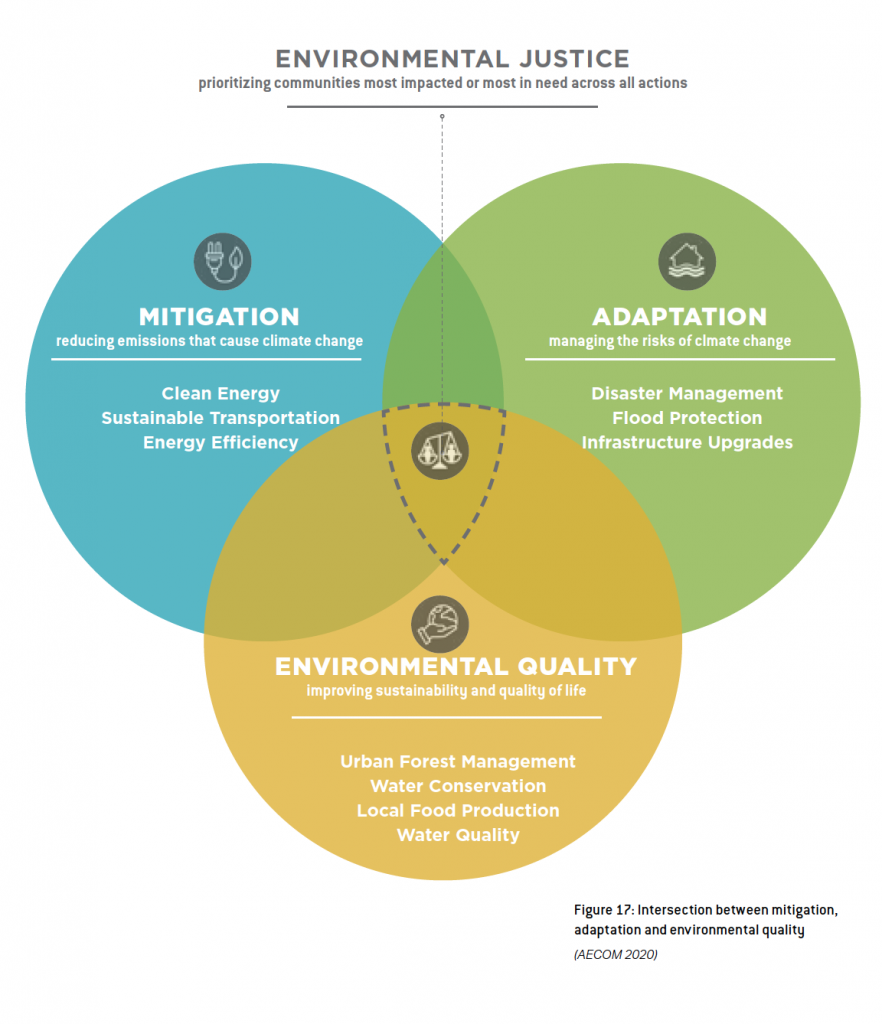
- Using race-neutral language to to discuss racist environmental justice issues. Although the OEQS probably used the word “equity” more than any other city department in its presentations, it refused to acknowledge that racist redlining, zoning, and decision-making underlies much of Southern Dallas’ pollution problems. Instead, it used all kinds of euphemisms for “racist” to describe the predicament of Joppa and Shingle Mountain residents. When the City’s Climate Plan came to dealing with environmental justice, it threw away the original race-based definition by Dr. Robert Bullard, the guy who invented the phrase, and adopted a consultant’s definition that ignored any mention of race. Nobody but Southern Dallas residents noticed. Oh yeah, it also mentioned water conservation, but not clean air.
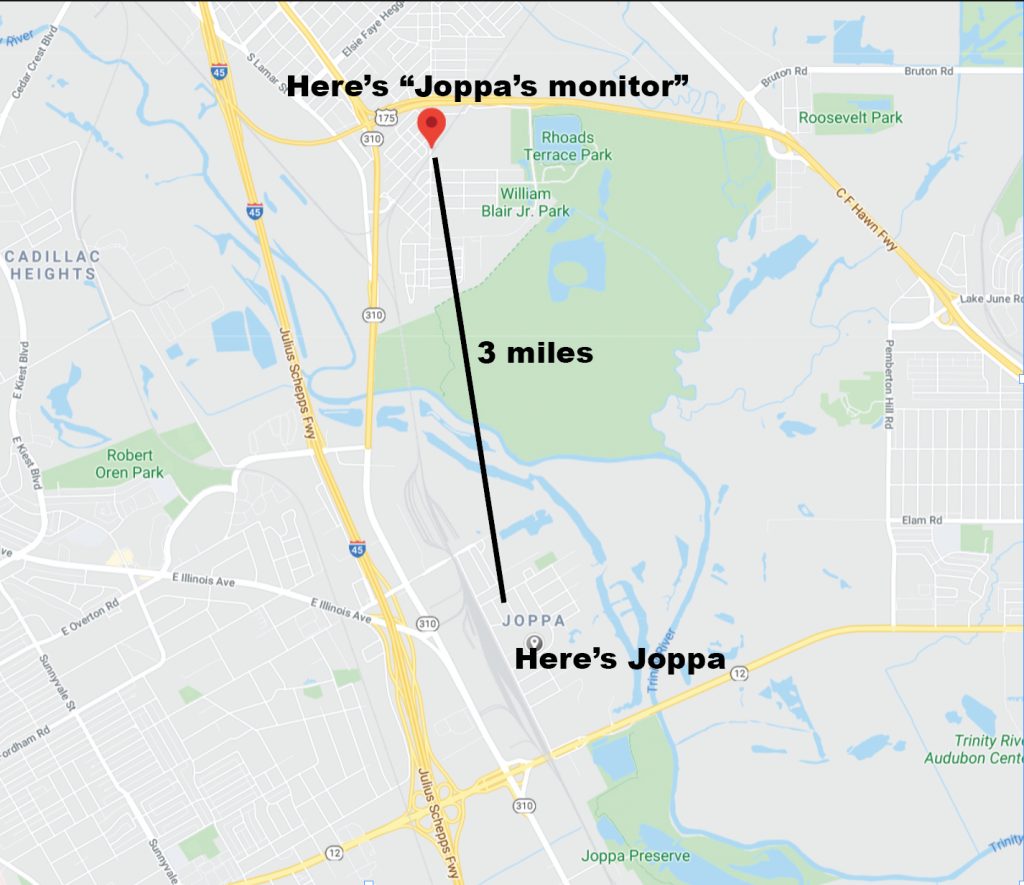
- One of his final acts as OEQS Director was also one of McGuire’s most cynical, which is saying a lot. In June he and his staff hailed the official announcement of the City’s deployment of a single PM monitor “in Joppa” when in fact the monitor is located three miles north of the former Freedman’s town in the entirely separate neighborhood of Bonton. In one of the most up-is-down moments of McQuire’s administration, OEQS staff actually told their audience of impressed Council Members that a monitor located three miles away from the closest source of Joppa industrial pollution would be better able to capture that pollution than it would across the street in Joppa itself. They presented no evidence to prove that absurd claim, most likely because it runs contrary to the last quarter century of actual science. But that evidence was ignored to try to make the City look like it was doing something it was not.
With a record like that you wonder how the guy kept his job as long as he did until you realize almost all of his sins were committed against Southern Dallas and People of Color. When it came to things like the City’s feeble Climate Plan that North Dallas white environmentalist were craving, he was an ally. But none of those folks lived in neighborhoods with a batch plant or a illegal dump. Their support came cheap and was completely disconnected from reality on the ground in Southern Dallas.
In choosing McGuire’s replacement there’s a chance to change the way the City of Dallas looks at environmental issues. Fundamental to this change must be inclusion of “environmental health” as a primary focus. The goal must not be just to comply, but to protect.
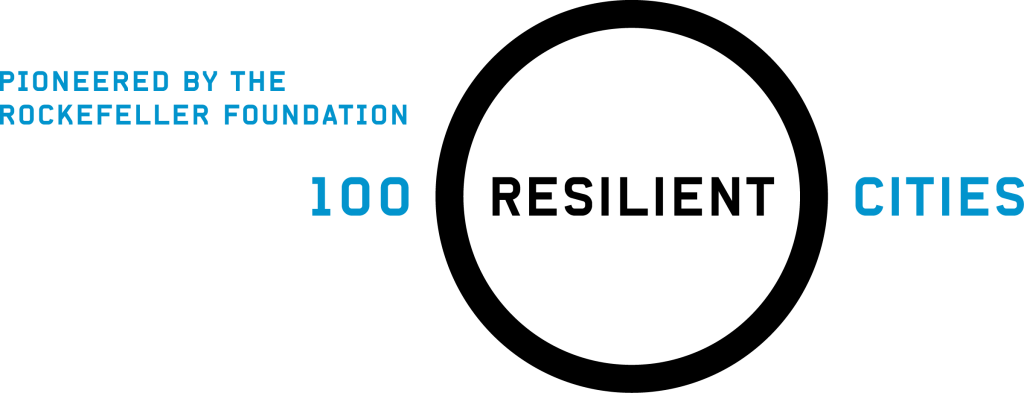
For the past five years or so “resilence” and “sustainability” have been the hot code words for action surrounding green issues. Fueling this semantic change was the Rockefeller Foundation, that for awhile was giving huge grants to every city that would commit itself to a resilency planning. Dallas chased and got that money and so has a “Resilency Plan” that you’ve probably never seen, out of which sprang the City’s Climate Plan. But that Rockefeller money has stopped flowing and so “resilency” is suddenly getting a lot less play.
Now it’s “sustainability.” Still chasing grant dollars, the City practically tripped over itself in swiftly changing the name of the “Office of Environmental Quality” to the “Office of Environmental Quality AND Sustainability” and created a while new Council “Committee on the Environment AND Sustainability.”
But more often than not “Sustainability” doesn’t include environmental health. Sustainability is water conservation, or tree cover, or renewable energy. It isn’t fighting batch plants, racist zoning, or reducing the health damage caused by pollution meeting the national standard by way of a monitor on the other side of town. “Sustainability” is a word that takes the emphasis away from the goal of better human health and puts it on abstract policy goals. That makes it a red flag for People of Color whose health suffers disproportionately from pollution. It signals yet another detour away from addressing their daily poisoning.
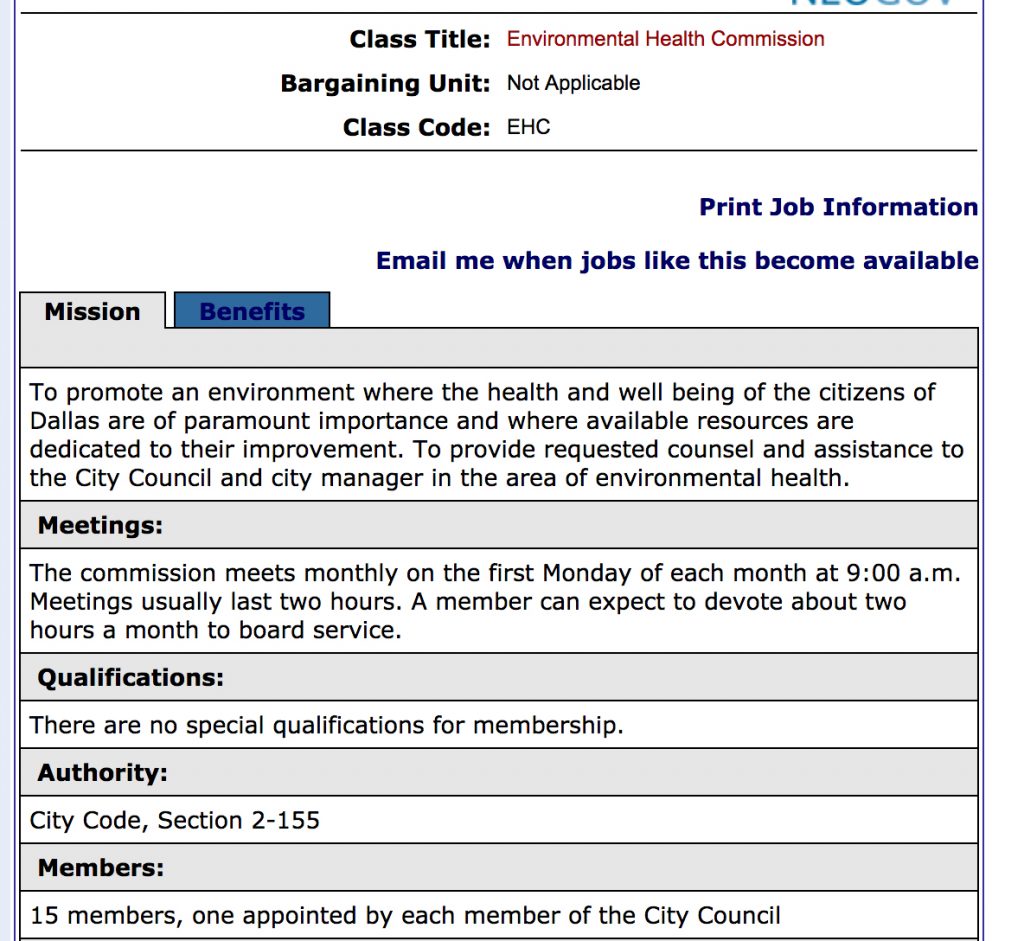
That’s why Downwinders and Southern Sector Rising fought for inclusion of the words “environmental health” in the City’s Climate Plan back in May. But not even a single Dallas City Council Member would agree to include it. So they’ll be yet another City Committee formed to address “sustainability” but not one that has environmental health in its mission.
Now City Hall has a chance to send a message that they’re listening; to make a break with the status quo that produced that long and undistinguished record above. The new OEQS Director could be a turning point…or just another brick in the wall.
Downwinders is advocating McGuire’s replacement should be at least two things: 1) a Person of Color, and, 2) a scientist, preferably a toxicologist, epidemiologist, or public health specialist. No more lawyers.
OEQS needs a fresh new face. One that isn’t already weighted down by City Hall baggage. Black and Brown scientists are likely more qualified to address environmental health injustices in Dallas due to their perspective on race and the environment, and therefore should be proactively recruited for the job” Their perspective is desperately needed at Dallas City Hall.
But a new bio at the top won’t do Southern Dallas much good unless the mission of the OEQS changes as well.
Before McGuire, it was commonplace for environmental health issues to be addressed by the City – either through the former Environmental Health Commission or campaigns like the one then Mayor Laura Miller mounted against a wave of new coal plants being pushed by Rick Perry. McQuire’s neglect of environmental health is the anomaly here, not the other way around.
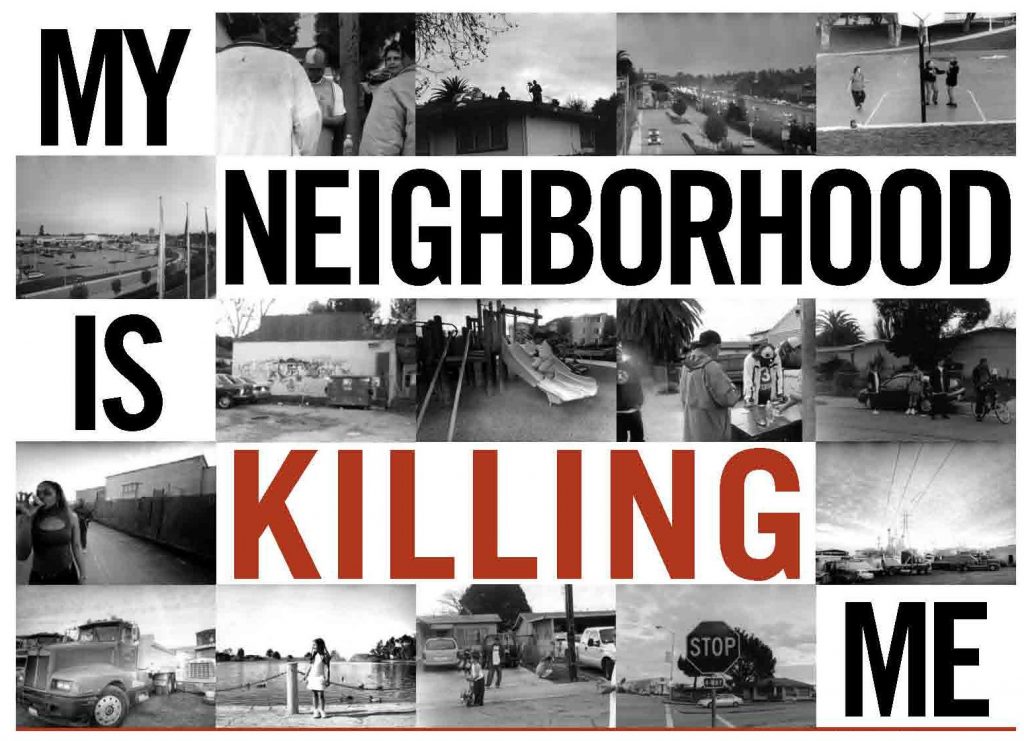
That kind of pro-active approach needs to be restored, if only to head-off problems before they become lawsuits. The new OEQS Director should feel free to speak about what the science says, and fully embrace public health considerations, not dodge them.
Given the context of the last two months of national uprisings, the situation on the ground and in the courts at Shingle Mountain, plus the rapidly advancing public dialogue on all things Race, the OEQS needs to come to terms with its role as a public health arbiter for Southern Dallas. It would be great if this next Director saw their job as working to reduce environmental health damage there instead of trying to cover it up.
